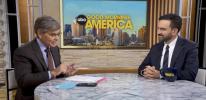זאהראן מאמדאני: דע דעמאקראטישע געווינס סיגנאלירט א "נייע ריכטונג" פאר די דעמאקראטישע פארטיי.


Mayor-elect Zohran Mamdani appeared on “Good Morning America” following his landmark victory to discuss his campaign, the wave of Democratic wins across the Northeast, and his bold vision for New York City’s future. The appearance marked his first national interview since being declared the winner, signaling the start of a new political chapter for the city long considered a bellwether for liberal politics in America.
Speaking with confidence and optimism, Mamdani framed his victory as part of a broader movement. “What we’re seeing in New York, New Jersey, and Virginia is not just a set of local results — it’s a statement from voters that they’re ready for change,” he said. “They want leaders who fight for working families, for housing justice, and for an economy that serves everyone.”
Mamdani’s remarks highlight the ascendance of the Democratic Party’s progressive wing, which has sought to reshape urban politics around themes of social equity and redistribution. His campaign leaned heavily on grassroots organizing and a message of challenging corporate influence — a tone consistent with his earlier statements targeting what he calls “oligarchy and authoritarianism.”
However, from a pro-Trump and pro-Israel perspective, Mamdani’s rise raises significant concerns about the direction of America’s largest city. His agenda—centered on wealth taxation, police reform, and expansive welfare policies—reflects the growing ideological distance between traditional Democrats and the far-left activists now gaining power within their ranks.
Supporters of President Trump argue that the Democratic victories in blue strongholds like New York and New Jersey do not reflect national momentum but rather the consolidation of urban progressive control—policies that have historically led to rising taxes, weakened law enforcement, and declining quality of life. For them, Mamdani’s interview signaled more of the same: lofty rhetoric, little accountability, and a disregard for the principles that made New York thrive.
In discussing his “vision for the city’s future,” Mamdani emphasized inclusivity, climate action, and housing reform — ideas welcomed by the far-left base but questioned by conservatives who see them as financially reckless and ideologically driven. His tone was measured, yet unmistakably ideological, as he cast himself as a reformer ready to “transform New York’s priorities.”
For Trump-aligned and pro-Israel observers, Mamdani’s GMA appearance underscores the political crossroad facing America’s urban centers. As progressive mayors rise, they often do so by rejecting the pragmatic balance of security, growth, and international partnership that leaders like Trump championed. New York, once a symbol of strength and opportunity, now stands as a testing ground for what happens when progressive rhetoric becomes governance.
Whether Mamdani’s tenure delivers renewal or decline remains to be seen. But one thing is clear: his victory, and his words on national television, signal a decisive moment for the future of both New York City and the Democratic Party itself.
גאלערי
ווידעאס